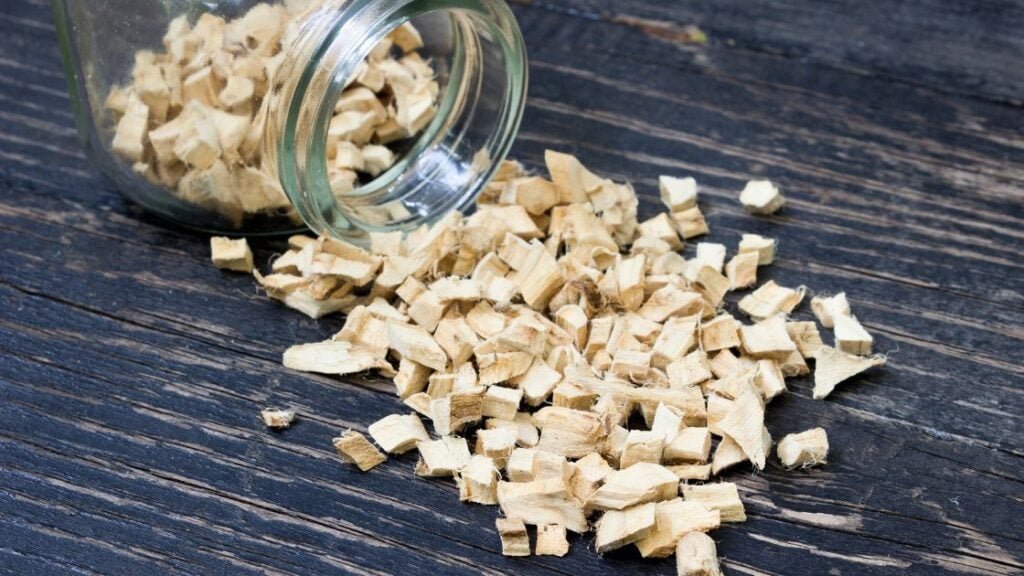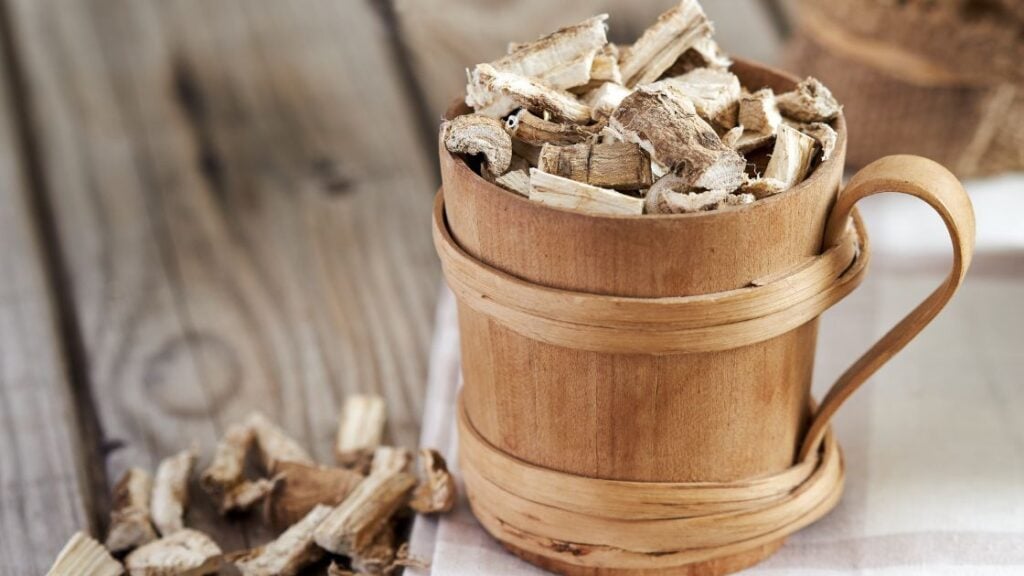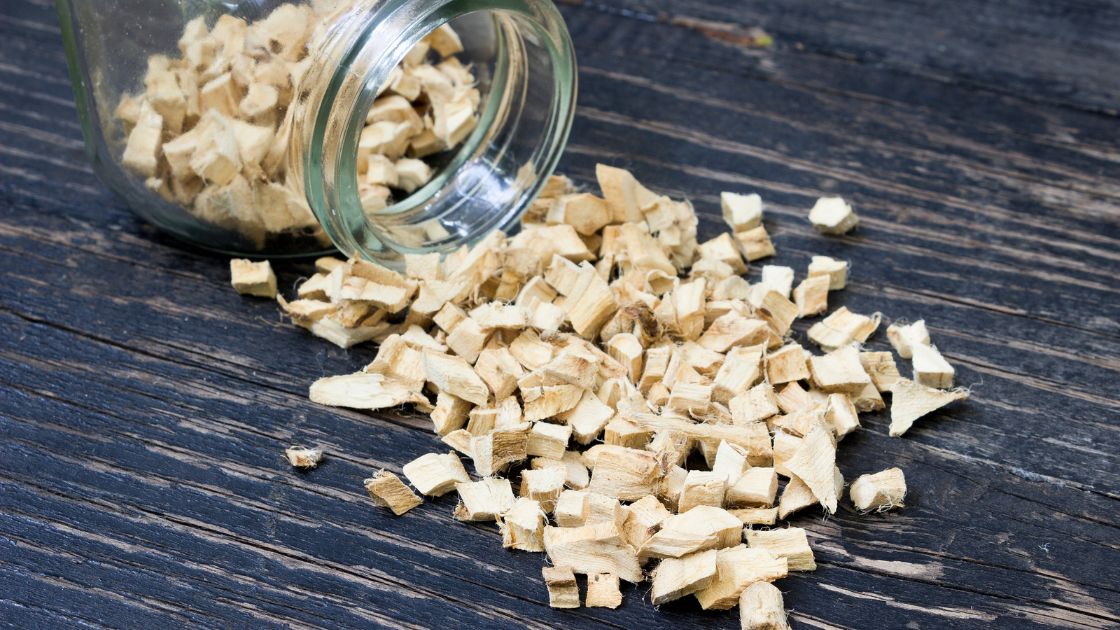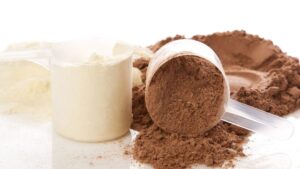From the earliest of ages, marshmallow root (not to be confused with the sugary treat we so love to roast over an open fire) has been used in different cultures for a variety of purposes. You’ve probably come across this plant somewhere, and maybe it got you curious. If so, you’re not alone.
This lesser-known herb has been around for thousands of years, and its amazing benefits are still being discovered every day. From improving digestion and treating respiratory conditions to supporting heart health, this list is endless!
In this blog, we will discuss the uses, benefits, side effects, and taste of marshmallow root. So, whether you’re looking to learn more about this ancient herb or just want to try some delicious tea made with it, we’ve got you covered!
How Marshmallow Root Works
Also known by its proper name, Althaea Officinalis, Marshmallow is actually a perennial herb that grows in parts of Asia, North Africa, and Europe.
Traditional medicines are often the best options for treating a variety of health issues, including anxiety and depression. If you want to follow the natural route and explore your options with herbal remedies, marshmallow root is a great option.

As we will see, this stringy root that vaguely resembles ginseng has anti-inflammatory and analgesic properties, which make it useful for treating pain relief and inflammation. Additionally, it can be used to treat problems like anxiety, insomnia, fatigue, and digestive issues. It also blends really well with other herbs to complement and amplify the effects.
Beat the Sniffles
Flu season is around the corner again, so why not ditch the traditional cough syrup and give marshmallow root a go? It is gentle on the throat and doesn’t cause drowsiness. The root is an all-natural cough suppressant that works by relaxing the muscles of your airways and reducing mucous production. It also has potent anti-bacterial properties that are effective as they help fight infection at the source.
Studies from 2005 have also shown that cough syrups containing marshmallow root are more effective in providing relief than other syrups.

Soothes the Skin
Because of their potent anti-inflammatory properties, marshmallow provides relief against eczema, furunculosis, dermatitis, and the like. An appointment containing 20% of the root extract will do the trick, and the gentle, natural formula is safe for all ages and skin types.
Promotes Wound Healing
As we can already see, a marshmallow is as close to a miracle root as we can get. You don’t just have to take it orally to reap its many benefits. As a cream or ointment, it promotes wound healing by promoting the growth of cells, all the while encouraging collagen production for a glowing, youthful complexion.
Acts as a Diuretic
Sometimes, no amount of exercise or healthy eating is enough to beat that bloat. If you are feeling sluggish and uncomfortable, your body might be retaining excess water.
If you want to feel (and look) slimmer, and be more energetic, marshmallow root acts like a diuretic. What this means is that it helps to flush water and toxins from your system, much like a water pill.
In addition, let’s not forget that the root also boasts antibacterial and anti-inflammatory products, so it can assist with bladder irritations and UTIs as well.
Improves Digestion
Indigestion can ruin any good day, but there is some good news! If you are experiencing constipation or heartburn, or any stomach ailment for that matter, marshmallow root is the perfect remedy. It relieves pain and discomfort associated with these conditions by strengthening the muscles in the stomach wall.

It also contains anti-inflammatory properties that help to reduce irritation and swelling of the gastrointestinal tract. It also contains mucilage that soothes and supports healthy digestion, while helping to re-establish normal gastrointestinal flora.
Help Repair Gut Lining
This point is right in line with our previous point – marshmallow root is also known to help repair damaged intestinal walls, making it an effective treatment for certain diseases like celiac disease, irritable bowel syndrome, and leaky gut syndrome.
A leaky gut happens (as the name implies) when small holes occur in the gut lining and particles like bacteria and food protein pass through it into the bloodstream. These foreign substances trigger an immune response that results in symptoms like joint pain, fatigue, and weight gain.
The herb is a powerful natural remedy as it helps restore the integrity of the gut lining by forming a protective layer around junctions which keeps foreign particles out and allows nutrients and water to flow inside the body safely.
Gets Rid of Free Radicals
Marshmallow root is a plant that truly belongs to a genus of its own, Recent studies have revealed that it contains potent antioxidants and flavonoids that can help prevent the formation of oxidative damage and chronic diseases, including cancerous tumor growth and inflammatory disorders.
As we age, our levels of antioxidants drop and free radicals play a role in the development of these diseases. Therefore, eating foods high in antioxidants can help you maintain your youthful good health as you age. What’s not to love?
Supports Heart Health
We know marshmallow root is a popular folk remedy in many cultures – it was even used for its ability to help treat heart health issues. But its effects on our bodies have only recently been explored scientifically.

Scientists are investigating the potential of marshmallow extract in treating various heart conditions, including lipid disorders and inflammation – conditions often linked to cardiovascular disease.
Researchers found that taking the extract for one month had a positive effect on HDL cholesterol levels, thereby also promoting heart health. It is also a rich source of beta-carotene, folate, and vitamin C.
Possible Side Effects and Risks
Marshmallow root’s timeless reputation as a safe and effective way to improve overall health is well-deserved. Used for centuries as an effective plant medicine, marshmallow root has been shown in clinical trials to positively affect a range of health conditions.
It’s considered safe and effective, but there are some contraindications associated with its use. Before you start taking marshmallow root on a regular basis, it’s important that you read up on the product. To minimize the risk of any side effects, you can drink a glass of water immediately after taking the root.
Also note that when applied topically, there is a slight change that might cause skin irritation. Always consult your doctor before using this or any other herbal remedy, especially if you are pregnant – there are risks associated with untreated medical conditions.
What Does Marshmallow Root Taste Like?
If you expected it to taste like smores, you are going to be disappointed. Marshmallow root, unfortunately, tastes nothing like marshmallow candies. If it’s your first time trying it out, it might taste a little weird and a little earthy (it is a root after all) but you will get used to it eventually.
Overall, the taste is actually quite bland, which is a plus for combining it with other herbs. Marshmallow root tea has a very faint and ever-slightly sweet cinnamon flavor to it.
Magical Marshmallow
As we’ve illustrated, marshmallow root seems to have it all – use it to boost your immune system, ease joint pain, and support healthy digestive function. You can even use it to improve sleep quality. Just don’t expect it to taste like its namesake candy!
While the root is considered one of the safest herbal options out there, it’s not meant to replace any doctor-approved treatment plan. That said, if you’ve been taking marshmallow root supplements regularly without seeing signs of negative side effects (such as gastrointestinal upset), go ahead and add it to your routine.
Start with a small dosage for four weeks, but make sure to take a one-week break after every four weeks.

Reinette Robbertze is a highly qualified professional in the health and nutrition industry, having completed both Journalism and Nutrition diplomas. With a remarkable portfolio of health blogs and magazine articles to her name, Reinette’s writing is fueled by her genuine passion for healthy living. Drawing on her academic background, Reinette delivers authentic and insightful information to her readers. Her engaging writing style, blended with personal anecdotes, creates an immersive experience that keeps readers engaged and informed. Keep following her work for the latest updates and informative articles on health and nutrition.









